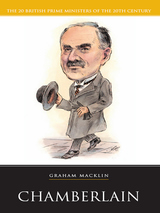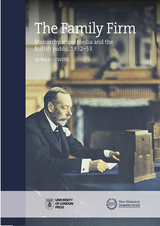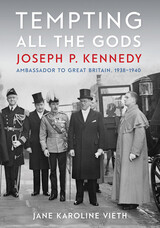8 books about 1936-1945

Baldwin
Anne Perkins
Haus Publishing, 2006
Prime Ministers Series, Baldwin was at the helm during the General Strike and the Abdication.
[more]

Chamberlain
Graham Macklin
Haus Publishing, 2006
Former British Prime Minister who will always be remembered for his appeasement policy towards Hitler.
[more]

Churchill
Chris Wrigley
Haus Publishing, 2006
Part of the 20 Prime Ministers Series
[more]

The Family Firm
monarchy, mass media and the British public, 1932-53
Edward Owens
University of London Press, 2019
The Family Firm presents the first major historical analysis of the transformation of the royal household’s public relations strategy in the period 1932-1953. Beginning with King George V’s first Christmas broadcast, Buckingham Palace worked with the Church of England and the media to initiate a new phase in the House of Windsor’s approach to publicity. This book also focuses on audience reception by exploring how British readers, listeners, and viewers made sense of royalty’s new media image. It argues that the monarchy’s deliberate elevation of a more informal and vulnerable family-centred image strengthened the emotional connections that members of the public forged with the royals, and that the tightening of these bonds had a unifying effect on national life in the unstable years during and either side of the Second World War. Crucially, The Family Firm also contends that the royal household’s media strategy after 1936 helped to restore public confidence in a Crown that was severely shaken by the abdication of King Edward VIII.
[more]

Palestine between Politics and Terror, 1945–1947
Motti Golani
Brandeis University Press, 2013
British General Sir Allan Cunningham was appointed in 1945 as high commissioner of Palestine, and served in this capacity until the end of the British mandate on May 15, 1948. The three years of Cunningham’s tenure were tremendously complex politically: players included the British government in London, the British army, the British administration in Jerusalem, and diverse military forces within the Zionist establishment, both Jew and Arab. Golani revisits this period from the perspective of the high commissioner, examining understudied official documents as well as Cunningham’s letters, notes, and cables. He emphasizes especially the challenges of navigating Jewish and Arab terrorists, on the one hand, and the multiple layers of British institutional bureaucracies, on the other, and does an excellent job of establishing Sir Allan’s daily trials within the broad frame of the collapse of the British Empire following World War II.
[more]

The Social Construction of Expertise
The English Civil Service and Its Influence, 1919–1939
Gail Savage
University of Pittsburgh Press, 1996
The British created a system wherein the social identity of civil servants clearly influenced their position on official matters. This privileged class set the tone for major policy decisions affecting all members of society. Savage addresses this social construction of power by analyzing the social origins and career patterns of higher-level civil servants as a backdrop for investigating the way four different social service ministries formulated policies between the two World Wars: the Board of Education, the Ministry of Agriculture, the Ministry of Labour, and the Ministry of Health.
[more]

Tempting All the Gods
Joseph P. Kennedy, Ambassador to Great Britain, 1938–1940
Jane Karoline Vieth
Michigan State University Press, 2021
Tempting All the Gods is a detailed study of Joseph P. Kennedy’s diplomatic career in London. It examines Kennedy’s role as ambassador to the Court of St. James’s from 1938–1940, a crucial time in world history. It describes his attitudes toward American foreign policy before the outbreak of war and after the war began, explains why he held those views, and assesses their impact on Anglo-American relations. It also looks at the diplomatic background against which he worked, at the political philosophies and personalities of the statesmen with whom he dealt, and at his relations with them, particularly President Franklin Roosevelt and British Prime Ministers Neville Chamberlain and Winston Churchill. Here the reader will find a meticulously researched account of Kennedy’s career based on the latest evidence available, providing a current and balanced historical reassessment. Scholars will be able to study Kennedy’s diplomatic career within the broader context of international relations and also to gain a fuller understanding of his view of his own motives and policies, including an understanding of why the ambassadorship was the greatest achievement—with the poorest outcome—in the varied life of an intensely ambitious man who was dedicated foremost to family, friends, and fortune. This book will prove significant to students of Anglo-American relations and of World War II, and to the general public, with its enduring fascination with the Kennedy family.
[more]

Wallis's War
A Novel of Diplomacy and Intrigue
Kate Auspitz
University of Chicago Press, 2015
Scandalous divorcée. Nazi sympathizer. Style icon. Her Grace the Duchess of Windsor. Such are the many—and many times questionable—monikers of the infamous Wallis Simpson. And with Wallis’s War, Kate Auspitz adds another to this list: unwitting heroine.
The facts: reviled by the British as a social-climbing seductress even as Time magazine named her its 1936 Woman of the Year, Simpson was the American socialite whose affair with King Edward VIII led him to abdicate the throne on the eve of WWII. In this fanciful novel written in the form of a fictional memoir, Auspitz imagines an alternative history in which Simpson was encouraged by Allied statesmen to remove defeatist, pro-German Edward from the throne, forever altering the course of the war. A comically unreliable narrator who knows more than she realizes, and reveals more than she knows, Simpson leads us from historic treaties and military campaigns to dinner parties and cruises as she describes encounters with everyone from Duff and Diana Cooper to Charles Lindbergh, Coco Chanel, and Hitler—all the while acting as a willing but seemingly oblivious pawn of international intrigue.
A rare blend of diplomacy and dalliance, fashion and fascists, this meticulously researched satire offers witty and erudite entertainment and leaves us speculating: who really brought about the abdication and—always—what were they wearing?
The facts: reviled by the British as a social-climbing seductress even as Time magazine named her its 1936 Woman of the Year, Simpson was the American socialite whose affair with King Edward VIII led him to abdicate the throne on the eve of WWII. In this fanciful novel written in the form of a fictional memoir, Auspitz imagines an alternative history in which Simpson was encouraged by Allied statesmen to remove defeatist, pro-German Edward from the throne, forever altering the course of the war. A comically unreliable narrator who knows more than she realizes, and reveals more than she knows, Simpson leads us from historic treaties and military campaigns to dinner parties and cruises as she describes encounters with everyone from Duff and Diana Cooper to Charles Lindbergh, Coco Chanel, and Hitler—all the while acting as a willing but seemingly oblivious pawn of international intrigue.
A rare blend of diplomacy and dalliance, fashion and fascists, this meticulously researched satire offers witty and erudite entertainment and leaves us speculating: who really brought about the abdication and—always—what were they wearing?
[more]
READERS
Browse our collection.
PUBLISHERS
See BiblioVault's publisher services.
STUDENT SERVICES
Files for college accessibility offices.
UChicago Accessibility Resources
home | accessibility | search | about | contact us
BiblioVault ® 2001 - 2024
The University of Chicago Press









